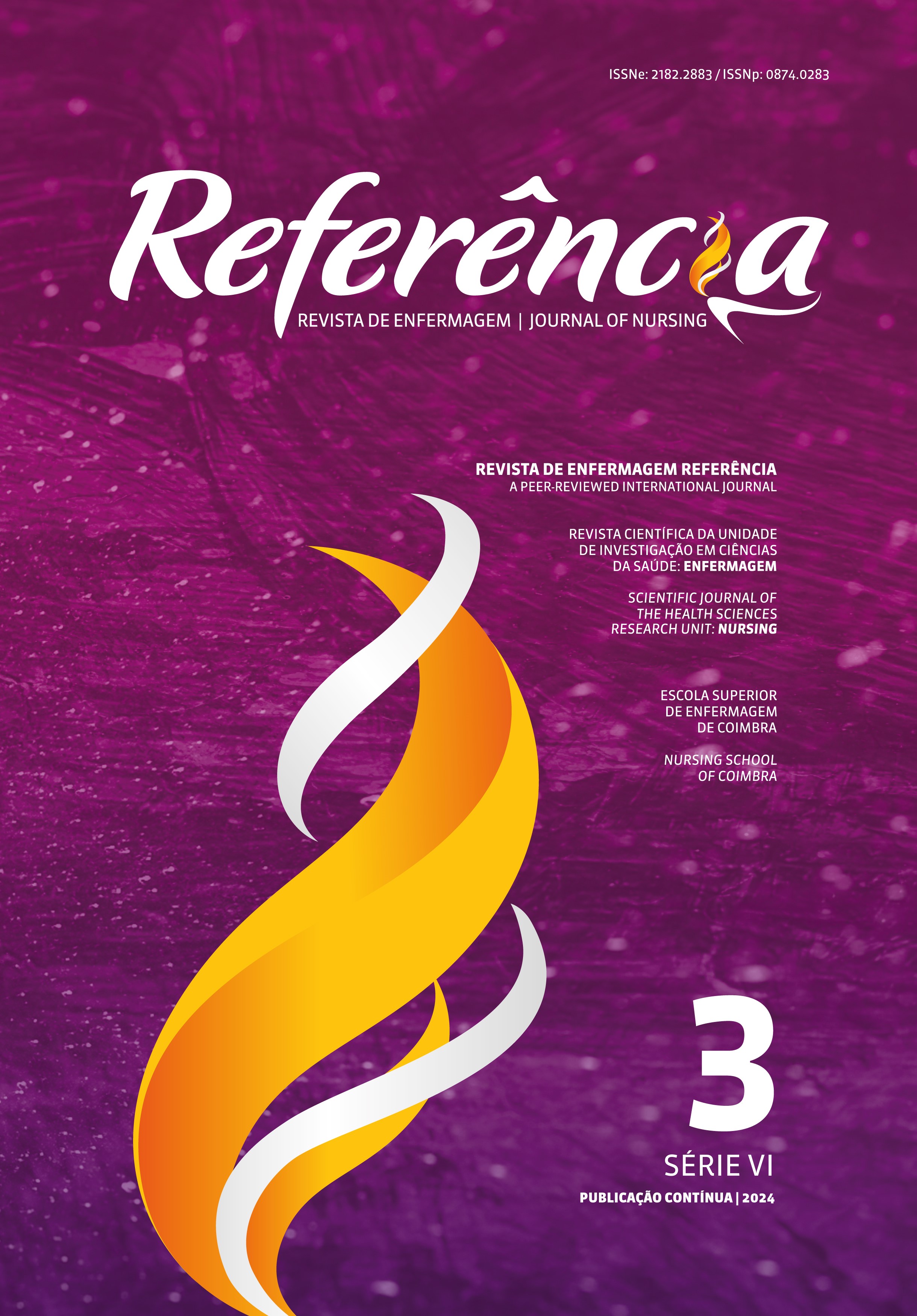Formal nurse leaders’ perception of evidence-based practice
DOI:
https://doi.org/10.12707/RVI23.90.32426Keywords:
nursing, evidence-based practice, leadership, health manager, hospitals, qualitative researchAbstract
Background: The implementation of Evidence-Based Practice (EBP) is decisive for the quality of nursing care. The actions developed by formal leaders are important to implement the EBP, making it crucial to know their perceptions.
Objective: To know the perceptions of formal nursing leaders about EBP.
Methodology: Descriptive exploratory study with a qualitative approach. Semi-structured interviews were conducted with 17 leaders from three Portuguese hospitals. Data were analyzed using content analysis (Bardin, 2020) and MAXQDA Analytic Pro 2022 software. Ethical assumptions were fulfilled.
Results: Two domains with their respective categories emerged: Knowledge about EBP (Concept of EBP, Impact of EBP on health outcomes and Self-perception of knowledge about EBP) and Role in the implementation of EBP (Behaviors and Characteristics).
Conclusion: The leaders described their perception of the concept of EBP and the relation of the impact of EBP with health outcomes, the need for knowledge and their training investment, as well as their role in this process. Future training programs should be implemented in this area.
Downloads
References
Aarons, G. A., Ehrhart, M. G., Farahnak, L. R., & Sklar, M. (2014). The role of leadership in creating a strategic climate for evidence-based practice implementation and sustainment in systems and organizations. Frontiers in Public Health Services and Systems Research, 3(4). https://doi.org.10.13023/FPHSSR.0304.03
Azevedo, V., Carvalho, M., Fernandes-Costa, F., Mesquita, S., Soares, J., Teixeira, F., & Maia, Â. (2017). Transcrever entrevistas: Questões conceptuais, orientações práticas e desafios. Revista de Enfermagem Referência, 4(14), 159-167. https://doi.org/10.12707/RIV17018
Bardin, L. (2020). Análise de conteúdo (4ª ed.). Edições 70.
Bergström, A., Ehrenberg, A., Eldh, A. C., Graham, I. D., Gustafsson, K., Harvey, G., Hunter, S., Kitson, A., Rycroft-Malone, J., & Wallin, L. (2020). The use of the PARIHS framework in implementation research and practice-a citation analysis ofthe literature. Implementation Science, 15(1), 68. https://doi.org/10.1186/s13012-020-01003-0
Brink, H., Walt, C., & Rensburg, G. (2018). Fundamentals of research methodology for healthcare professionals (4th ed.). Juta and Company.
Decreto-Lei n.º 71/2019 da Assembleia da República. (2019). Diário da República: I série, nº 101. https://diariodarepublica.pt/dr/detalhe/lei/71-2019-124346822
International Council of Nurses. (2012). Closing the gap: From evidence to action. https://www.nursingworld.org/~4aff6a/globalassets/practiceandpolicy/innovation--evidence/ind-kit-2012-for-nnas.pdf
Jordan, Z., Lockwood, C., Munn, Z., & Aromataris, E. (2019). The updated Joanna Briggs Institute model of evidence-based healthcare. JBI Evidence Implementation, 17(1), 58-71. https://doi.org/10.1097/XEB.0000000000000155
Loureiro, L. M. (2006). Adequação e rigor na investigação fenomenológica em enfermagem: Crítica, estratégias e possibilidades. Revista de Enfermagem Referência, 2(2), 22-32. https://rr.esenfc.pt/rr/index.php?module=rr&target=publicationDetails&pesquisa=enfermagem&id_artigo=21
Lawson, D., & Fleshman, J. W. (2020). Informal leadership in health care. Clinics in Colon and Rectal Surgery, 33(4), 225–227. https://doi.org/10.1055/s-0040-1709439
Lunden, A., Kvist, T., Teräs, M., & Häggman-Laitila, A. (2021). Readiness and leadership in evidence-based practice and knowledge management: A cross-sectional survey of nurses’ perceptions. Nordic Journal of Nursing Research, 41(4), 187-196. https://doi.org/10.1177/2057158520980687
Mackey, A., & Bassendowski, S. (2017). The history of evidence-based practice in nursing education and practice. Journal of Professional Nursing, 33(1), 51-55. https://doi.org/10.1016/j.profnurs.2016.05.009
Majers, J., & Warshawsky, N. (2020). Evidence-based decision-making for nurse leaders. Nurse Leader, 18(5), 471–475. https://doi.org/10.1016/j.mnl.2020.06.006
McPherson, S., Reese, C., & Wendler, M. C. (2018). Methodology update: Delphi studies. Nursing Research, 67(5), 404-410. https://doi.org/10.1097/NNR.0000000000000297
Melnyk, B. M., & Newhouse, R. (2014). Evidence-based practice versus evidence-informed practice: A debate that could stall forward momentum in improving healthcare quality, safety, patient outcomes, and costs. Worldviews on Evidence-Based Nursing, 11(6), 347-349. https://doi.org/10.1111/wvn.12070
Melnyk, B. M., Tan, A., Hsieh, A. P., & Gallagher-Ford, L. (2021). Evidence-based practice culture and mentorship predict EBP implementation, nurse job satisfaction, and intent to stay: Support for the ARCC© Model. Worldviews on Evidence-Based Nursing, 18(4), 272-281. https://doi.org/10.1111/wvn.12524
Melnyk, B., & Fineout-Overholt, E. (2015). Evidence-based practice in nursing & healthcare: A guide to best practice (3rd ed.). Wolters Kluwer/Lippincott; Williams & Wilkins.
National Academies of Sciences, Engineering, and Medicine. (2021). The future of nursing 2020-2030: Charting a path to achieve health equity. The National Academies Press. https://doi.org/10.17226/25982
National Institute for Health and Care Excellence. (2021). Shared decision making. https://pubmed.ncbi.nlm.nih.gov/34339147/
Pearson, A., Wiechula, R., Court, A., & Lockwood, C. (2005). The JBI model of evidence-based healthcare. International Journal of Evidence-Based Healthcare, 3(8), 207-215. https://doi.org/10.1111/j.1479-6988.2005.00026.x
Sackett, D., Straus, S., Richardson, W., Rosenberg, W., Haynes, R. (2000). Evidence-based medicine: How to practice and teach EBM (2nd ed.). Churchill Livingstone.
Shuman, C. J., Liu, X., Aebersold, M. L., Tschannen, D., Banaszak-Holl, J., & Titler, M. G. (2018). Associations among unit leadership and unit climates for implementation in acute care: A cross-sectional study. Implementation Science, 13(1), 1-10. https://doi.org/10.1186/s13012-018-0753-6
Stetler, C. B., Ritchie, J. A., Rycroft-Malone, J., & Charns, M. P. (2014). Leadership for evidence-based practice: Strategic and functional behaviors for institutionalizing EBP. Worldviews onEvidence-Based Nursing, 11(4), 219–226. https://doi.org/10.1111/wvn.12044
Waddell, A., Lennox, A., Spassova, G., & Bragge, P. (2021). Barriers and facilitators to shared decision-making in hospitals from policy to practice: A systematic review. Implementation Science, 16, 1-23. https://doi.org/10.1186/s13012-021-01142-y
Weaver, S. J., Mossburg, S. E., Pillari, M., Kent, P. S., & Biddison, E. L. (2018). Examining variation in mental models of influence and leadership among nursing leaders and direct care nurses. Journal of Nursing Care Quality, 33(3), 263-271. https://doi.org/10.1097/NCQ.0000000000000298






















